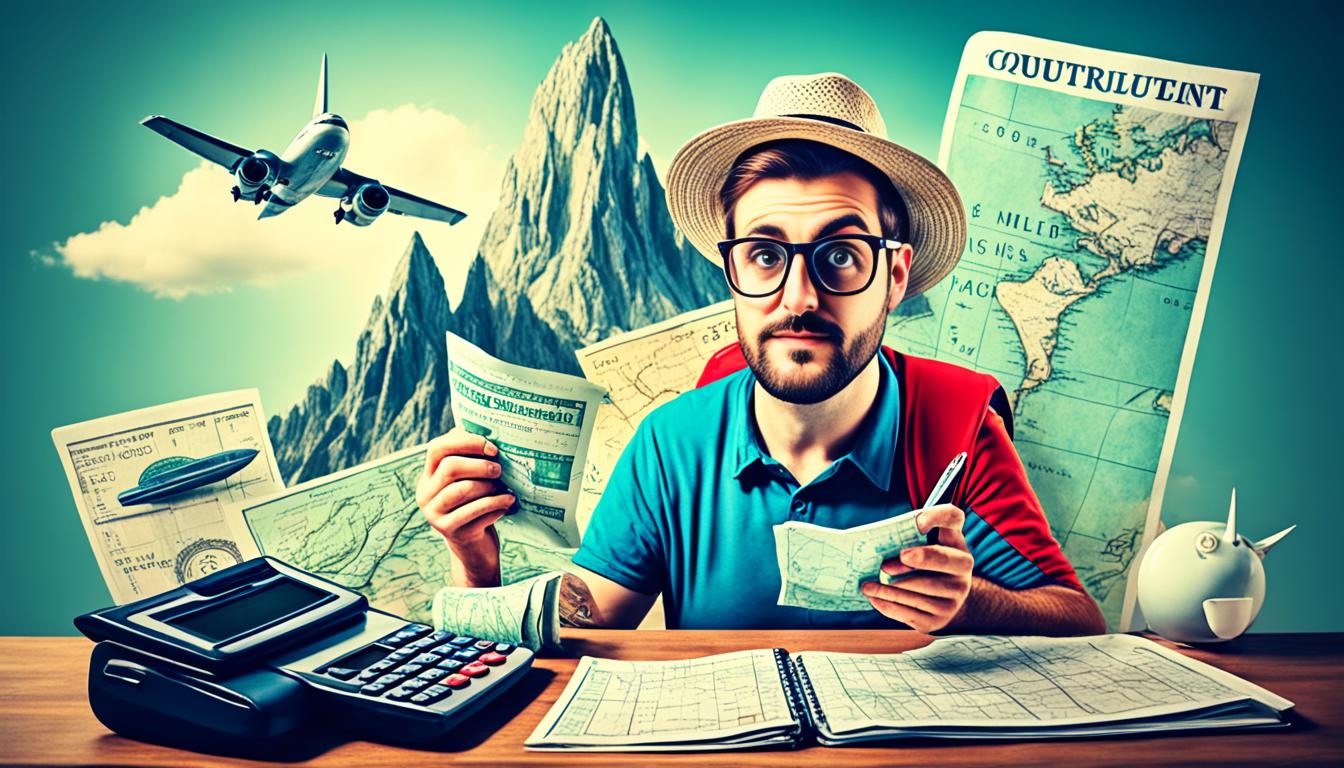Exploring places like Tokyo or Machu Picchu is achievable by mastering travel budgeting. By planning finances well and tracking expenses, you can avoid regrets after traveling. This way, you can enjoy great experiences without hurting your wallet.
Alex, a software developer, shows that good planning and tracking expenses pay off. His story highlights the real benefits of sticking to a travel budget. It proves that anyone can travel to amazing places without financial worries.
Introduction to Mastering Travel Budgeting
Travel budgeting makes wanderlust possible without hurting your wallet. It’s about setting smart goals and learning to plan finances. This way, you can turn your dream trips into real plans while keeping your money safe for later.
Looking for cheap travel means knowing your travel goals and costs like flights and hotels. You need to figure out what’s most important and adjust your spending. This lets you enjoy your trip fully without spending too much.
Using smart rules in company travel policies helps everyone follow the plan. This saves money and keeps employees happy. Having good travel systems and booking tools makes this easier.
It’s key to keep an eye on what you spend when traveling. Using online tools for booking and tracking expenses helps stick to your budget. Setting clear rules, like booking all travel with one team, avoids overspending.
By following these travel tips and using technology wisely, planning your money can really enhance your travels. This balance of fun and smart spending lets you explore more without financial worry.
Choosing Budget-Friendly Destinations
Finding the perfect getaway means looking at budget destinations. You want places that are affordable but still fun. Planning ahead helps a lot, whether you like hidden spots or famous cities with little money.
Picking lesser-known spots can save cash and offer unique experiences. These places are more affordable and less crowded. You’ll get to dive deep into the local culture.

It’s important to think about all costs like staying, eating, getting around, and fun things. Researching and comparing these will help keep your trip affordable. This way, you enjoy your journey without spending too much.
To wrap it up, choosing economical travel spots means you can see the world cheaply. Plan well, find unseen treasures, and check all expenses. This approach lets you have a rich experience while saving money.
The Benefits of Off-Season Travel
Traveling when it’s not busy brings lots of perks. These include big travel savings and better experiences. You pay less for hotels, flights, and fun stuff by avoiding the crowd. It means more money in your pocket. Check out how to save here. AARP members, for example, get a cool 5% off cruise prices with Hurtigruten Expeditions.
The off-season also means you won’t deal with many tourists. Places are less crowded, making your trip relaxing. You wait less at busy spots and meet more local folks. By being flexible with when you go, you get the most from your trip.
Choosing the right time to travel can bring you even more cool stuff. For instance, AARP members get a €100 credit to spend on board with Hurtigruten Expeditions. Whether by cruise or road, AARP has lots of deals to fit your budget. This makes off-season travel super tempting.
So, the secret to a great off-season trip is doing your homework. Find the best time to visit places. Change your plans to fit that schedule. This way, you get the most bang for your buck. You’ll also enjoy your trip way more. Learn how to save here.
Strategizing Your Accommodations
Looking for budget accommodations helps a lot in vacation budgeting. Consider staying in hostels, guesthouses, or vacation rentals. These can be cheaper than hotels. You can meet new people there. Most have kitchens, letting you cook meals instead of eating out.

Booking places to stay early can get you good deals. Staying a bit away from city centers saves money. Experts say flying mid-week is cheaper than the weekend. Smaller airports can be less costly than big ones. Some airlines offer stopover programs. These let you see new cities without paying more. Using shared kitchens saves on food costs. It’s fun to shop like a local, too.
Watch out for extra costs, like heavy bags or too many souvenirs. Save some money for surprises to cover unexpected costs. Use apps to manage your money when traveling. This helps keep your spending in check. Starting to save early and cutting back on daily buys can also grow your travel budget.
Using these ideas, vacation budgeting becomes easier. It turns what seems expensive into an affordable fun trip.
Travel Budgeting: Tools and Techniques
Travel budgeting isn’t just about cutting costs. It’s about using smart financial planning for travel. This way, you can make your dream trip come true.
Begin by setting clear travel goals. This makes your budget focus on what you need. Here are some key tools to use:
- Budgeting apps: These help you organize and track expenses in real-time.
- Automated savings: Set up automated transfers to grow your travel fund steadily.
- Expense tracking: Regularly monitor your spending to make necessary adjustments.
When you mix these tools with good financial planning for travel, you manage your money well. Keeping an eye on how you’re doing helps you avoid spending too much. This way, you can have a trip that’s both fun and affordable.
Saving Money on Food and Drinks
Travel tips on saving money focus on your spending for food and drinks. Eating out at restaurants can get pricey. Yet, street food is less costly and lets you taste the local flavors.
Exploring local markets is a smart start to budget dining. They offer fresh products and sometimes free samples. Shopping here and cooking your meals can save a lot. Plus, bringing snacks for sightseeing can cut down on spending.
To save more, eat less in tourist spots. Choose dining places in local areas with lower prices. Some accommodations offer snacks, and hostels might have food events at a minimal cost.
- Local bakeries reduce prices on goods late in the day.
- Pubs and bars near schools often have deals for students.
- Local breweries and wineries may let you taste for free.
Eating lunch out can be cheaper than dinner. Plan for a special meal once in a while to manage your budget. Also, check if tips are included to avoid tipping twice.
Following these travel tips on saving money makes your trip better. It lets you enjoy local dishes without spending much.
Maximizing Your Transportation Budget
Managing transportation costs is key for efficient travel budgeting. Public transit can save money and help you travel cheaply. By planning well, you can maximize your travel budget and see more with less.
- Use low-cost airlines and compare prices to get the best deals.
- Pick travel dates that are more flexible for cheaper fares.
- Save on road trips by carpooling or using budget-friendly rentals.
- Go for local public transport over taxis or ride-sharing.
Knowing about hidden costs is crucial. It stops surprise expenses and keeps you on budget. Use these tips for affordable travel. This way, you’ll spend less and enjoy your journey more.
Free and Low-Cost Activities to Enrich Your Travel Experience
Traveling well doesn’t need to be expensive. Economical travel leads you to free activities that are both enriching and memorable. You can explore nature trails and enjoy cultural events without spending much.
To save on travel, look for budget-friendly travel experiences that are free or cheap. Here are some activities that will make your trip better:
- Hiking and Nature Walks: Many places have free trails and parks. It’s a wonderful way to see a place’s natural beauty.
- Local Festivals and Events: Local events offer a peek into the area’s culture. And many don’t cost anything.
- Public Museums and Galleries: Some cities have days when museums and galleries are free. This lets you explore art and history without spending a lot.
- Beach Days: Visiting a beach is a great example of economical travel if you’re near the coast.
- City Walking Tours: Free walking tours by locals are available in many cities. They’re an excellent way to learn about the city’s history and culture.
Adding these free activities to your plans helps you keep travel affordable. Enjoying a place doesn’t mean you have to spend a lot. It’s about exploring what the destination offers naturally, for free.
Real-Life Travel Budgeting Success Stories
Stories of budget travel inspire those wanting to see the world affordably. Alex, a software developer, shows it’s possible. He enjoyed trips to Tokyo and Machu Picchu without hurting his wallet. He chose adventures over daily luxuries.
Alex set a smart budget for each trip. He cut unnecessary costs to save for travel. By using budget tools, he kept his spending in check. His story teaches us the value of good financial planning for travel.
A couple also shares their budget travel success. They saved by booking early and traveling off-season. Using cheaper transport, they saw Europe without spending a lot. They loved free hikes and local events. Their story shows smart budgeting can make travel dreams real.
